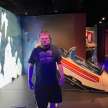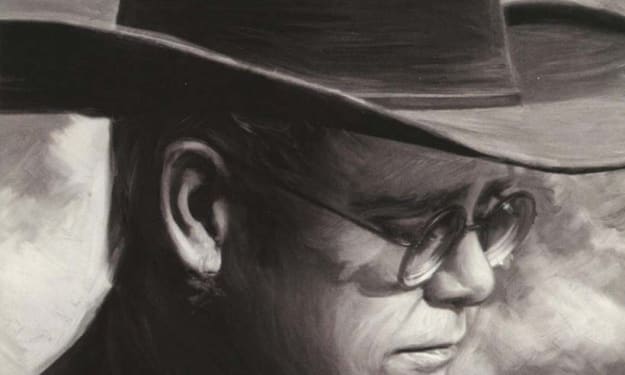'The Captain and The Kid'
Elton and Bernie's Musical Autobiography, continued!

In 2005, Elton John celebrated the 30th anniversary of 1975's excellent autobiographical album Captain Fantastic and the Brown Dirt Cowboy with a concert performing (almost) the entire album in sequence at Madison Square Garden. (Elton opted to exclude "Tower of Babel" and "Writing" from the concert.) It accompanied the release of a Deluxe Edition double-CD set that featured a 1975 performance of the entire album given with a brand-new band before a Wembley Stadium crowd. Now to say that playing an album to an audience unfamiliar with the songs nor the band was a challenge would be an understatement, especially as the bill was filled with hitmakers like the Beach Boys, Joe Walsh and the Eagles.
Elton has expressed some regret for the way in which he introduced the album at the time, but over the years a funny thing happened. While as any 1975 Elton album would, Captain Fantastic sold a ton; but unlike most of his albums after Yellow Brick Road, the album's reputation grew and grew more positive among both fans and critics. Ergo the 30th celebration, which was sufficiently successful to convince Elton (the Captain himself) and Bernie Taupin (the Brown Dirt Cowboy) to have a go at a sequel to the album, a new effort titled The Captain and the Kid.
New Taupin lyrics detailed the intervening decades since the story detailed in Captain Fantastic ended, ostensibly around the time of the release of Empty Sky. So ironically the flashy forthright album actually detailed a time when the Captain wasn't all that fantastic at all. But that obviously was about to change.
The album opens with a terrific track--a run through Elton and Bernie's first wild ride through America (in 1970) called "Postcards from Richard Nixon." The song sets itself in time from the word go, with a classic Elton piano line accenting well-chosen details of Elton, Bernie and the band's arrival in America and their reaction to seeing the land of their heroes, mostly in their time in California. Describing their journey through "Brian Wilson's promised land where Disney's god and he commands," and noting that Steve McQueen was "just about the coolest guy I'd ever seen," it's a strong opener that sets the stage for one of Elton's strongest albums. It even adds a bit of intrigue as it begs the question of what Richard Nixon actually might have said to them about creating "a diversion caused by two." Really, as strong a start to an Elton album since...well, maybe Captain Fantastic.
A Nigel Olsson drum fill starts "Just Like Noah's Ark" another in a series of Taupin biblical analogies for the music business. The song, which would gain some individual prominence the next year when it appeared in the ark-building scene in the film Evan Almighty, features fine keyboard work from Guy Babylon in what would be his last appearance on an Elton album before his 2009 death. At the end of the song Elton's dog Artur is heard barking along to John Mahon's Cowbell.
"I Wouldn't Have You Any Other Way (NYC)" is about Elton and Bernie's first visit to New York City, acting as a kind of counterpoint to the California-centric album opener. While the New York City part of their tour had as its most notable offshoot the fine, bare-bones live album 11-17-70, recorded for a radio program on that date, the song details all the wonders of the Big Apple as it appeared to a pair of previously untraveled British lads. While they seemed to be taken by New York as much as by Hollywood, the song itself is just a nice Elton ballad, not the groundbreaker that "Nixon" was.
"Tinderbox" details the incredible success Elton and Bernie enjoyed in the mid 70s while also detailing the dark side and unsustainable nature of such success, culminating in Elton's decision to work with other lyrical collaborators. The backing vocals from the band on this track really shine as well.
"And The House Fell Down" is another example of Elton setting a downbeat lyric to an upbeat song. Most prominently seen in his songs "Better Off Dead" (from Captain Fantastic) and "I Think I'm Going to Kill Myself," Elton has acknowledged this as one of his songwriting tricks. Thus this song describing Elton and Bernie's descent in the 80s into drug addiction and personal demons, and its effect on the John/Taupin pairing, comes as close to a rock song as anything on the album.
"Blues Never Fade Away" is a love letter to some of the many friends Elton and Bernie lost over the years from AIDS and overdose victims to Elton idol and eventual collaborator John Lennon.
Next is "The Bridge" a sparse piano-driven ballad melodically reminiscent of "Your Song," a part of which Elton works in over a few bars late in the song. The song is a touching ballad about the crossroads faced over a mostly successful but often challenging career that clocked in at nearly40 years long in 2006.
"I Must Have Lost It On The Wind" features prominent harmonica from Davey Johnstone and Cajon from John Mahon. According to Elton, it's about how disagreeable he could be at the worst of his cocaine addiction, though it makes for a better listen than that sounds.
"Old 67" starts out with another Nigel Olsson drum fill and details Elton and Bernie's early 2000s summit where they reminisced about a time of innocence and decided to rededicate themselves to making albums they could be proud of again.
"The Captain and the Kid" closes the album by reprising the motif that opened the prequel album, "Captain Fantastic and the Brown Dirt Cowboy." Nods to the prior track are evident throughout the track, though it does not recapture the musical adventure and originality of the first track. Still the music is good enough to lead the listener effortlessly through an excellent summation of Elton and Bernie's career.
Despite glowing reviews. The Captain and the Kid did not sell well. Elton placed most of the blame on the label Interscope Records, which he felt fell down on the promotion. In fairness, there were similar tempos throughout the album, there weren't obvious hit singles ("Postcard" is flat-out one of Elton's finest accomplishments but might not have had a place on the more adventurous radio of the 70s, let alone hit the airwaves in 2006). It was also one of Davey Johnstone's more subdued Elton albums, as he added excellent accents but did not feature very often at all.
A disappointed Elton would not record another traditional album for another 4 years, when fate (and producing a music show with one of his favorite contemporaries) would bring him together with an old idol from his past who had fallen on hard times.
About the Creator
Sean Callaghan
Neurodivergent, Writer, Drummer, Singer, Percussionist, Star Wars and Disney Devotee.






Comments
There are no comments for this story
Be the first to respond and start the conversation.